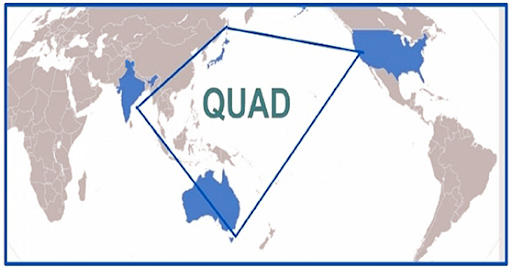International Relations
Upcoming Quad Meeting
- 15 Sep 2021
- 6 min read
Why in News
Recently, the US announced that the first in-person meeting of the Quad countries is going to be held in New York, US. The heads of all the four countries (India, Japan, Australia, and the US) are going to attend the meeting.
- Reacting to the upcoming summit, China criticized the Quad and said the formation of "exclusive cliques (circles)" targeting other countries runs counter to the trend of the times and is "doomed to fail".
Key Points
- Formation of the Quad:
- Following the Indian Ocean Tsunami (2004), India, Japan, Australia, and the US created an informal alliance to collaborate on disaster relief efforts.
- In 2007, then PM of Japan, Shinzo Abe, formalised the alliance, as the Quadrilateral Security Dialogue or the Quad.
- The Quad was supposed to establish an Asian Arc of Democracy but was hampered by a lack of cohesion amongst its members and accusations that the group was nothing more than an anti-China bloc.
- In 2017, faced again with the rising threat of China, the four countries revived the Quad, broadening its objectives and creating a mechanism that aimed to slowly establish a rules-based international order.
- In 2020, the trilateral India-US-Japan Malabar naval exercises expanded to include Australia, marking the first official grouping of the Quad since its resurgence in 2017.
- Further, it was the first joint military exercises among the four countries in over a decade.
- In March 2021, the Quad leaders met virtually and later released a joint statement titled ‘The Spirit of the Quad,’ which outlined the group’s approach and objectives.
- Objectives of the Quad:
- According to the ‘Spirit of the Quad’, the group’s primary objectives include maritime security, combating the Covid-19 crisis, especially vis-à-vis vaccine diplomacy, addressing the risks of climate change, creating an ecosystem for investment in the region and boosting technological innovation.
- However, despite the Quad’s seeming commitment to a broad range of issues, its main focus area is still considered to be countering China.
- Quad members have also indicated a willingness to expand the partnership through a so-called Quad Plus that would include South Korea, New Zealand, and Vietnam amongst others.
- Quad and its Linkage with China:
- Each of the Quad members are threatened by China’s actions in the South China Sea and its attempts to extend its sphere of influence through initiatives such as the One Belt One Road Project.
- The US has long been concerned about the global competition with China and have maintained that China aims to subvert the international rules-based order.
- Japan and Australia are likewise both concerned about China’s expanding presence in the South and East China Seas.
- India has its own long pending border issues with China.
- On the other hand, China sees the existence of the Quad as part of a larger strategy to encircle China and has pressured countries like Bangladesh to avoid cooperating with the group.
- The Chinese foreign ministry accused the group of openly inciting discord among regional powers in Asia.
- Each of the Quad members are threatened by China’s actions in the South China Sea and its attempts to extend its sphere of influence through initiatives such as the One Belt One Road Project.
- Issues Related to Quad:
- Undefined Vision: Despite the potential for cooperation, the Quad remains a mechanism without a defined strategic mission.
- The Quad is not structured like a typical multilateral organisation and lacks a secretariat and any permanent decision-making body.
- Additionally, unlike NATO, the Quad does not include provisions for collective defence, instead choosing to conduct joint military exercises as a show of unity and diplomatic cohesion.
- Maritime Grouping: The entire focus on the Indo-Pacific makes the Quad a maritime, rather than a land-based grouping, raising questions whether the cooperation extends to the Asia-Pacific and Eurasian regions.
- India’s Aversion of Alliance System: The fact that India is the only member that is averse to a treaty alliance system, has slowed down the progress of building a stronger Quadrilateral engagement.
- Undefined Vision: Despite the potential for cooperation, the Quad remains a mechanism without a defined strategic mission.
Way Forward
- Need For Clear Vision: The Quad nations need to better explain the Indo-Pacific Vision in an overarching framework with the objective of advancing everyone’s economic and security interests.
- This will reassure the littoral States that the Quad will be a factor for regional benefit, and a far cry from Chinese allegations that it is some sort of a military alliance.
- The forthcoming Ministerial meetings can be an opportunity to define the idea and chart a future path.
- Expanding Quad: India has many other partners in the Indo-Pacific, therefore India should pitch for countries like Indonesia, Singapore to be invited to join in the future.
- India should develop a comprehensive vision on the Indo-Pacific which would ideate on the current and future maritime challenges, consolidate its military and non-military tools, engage its strategic partners.





